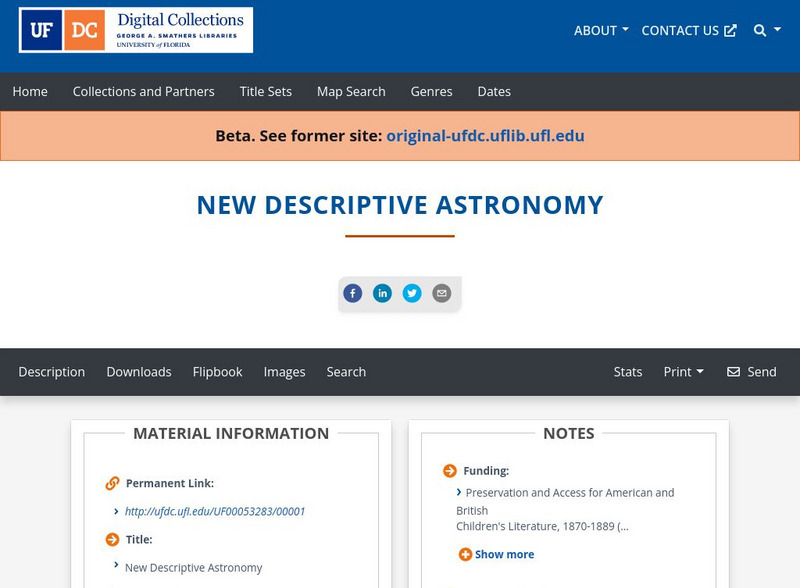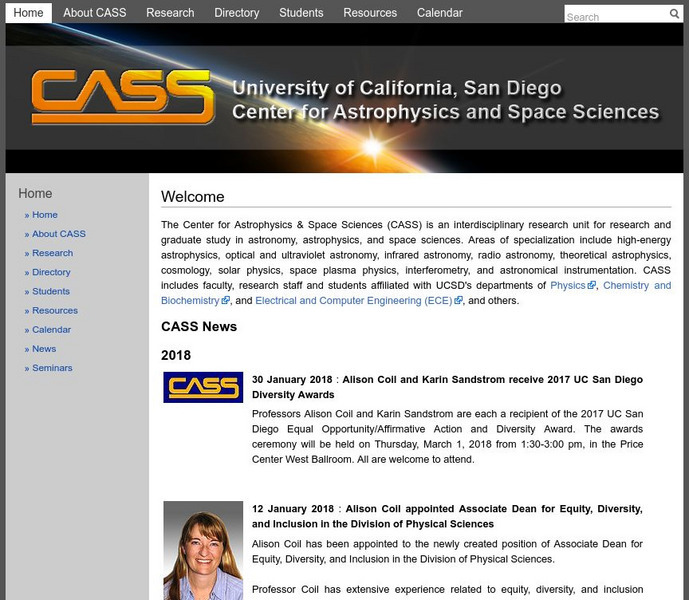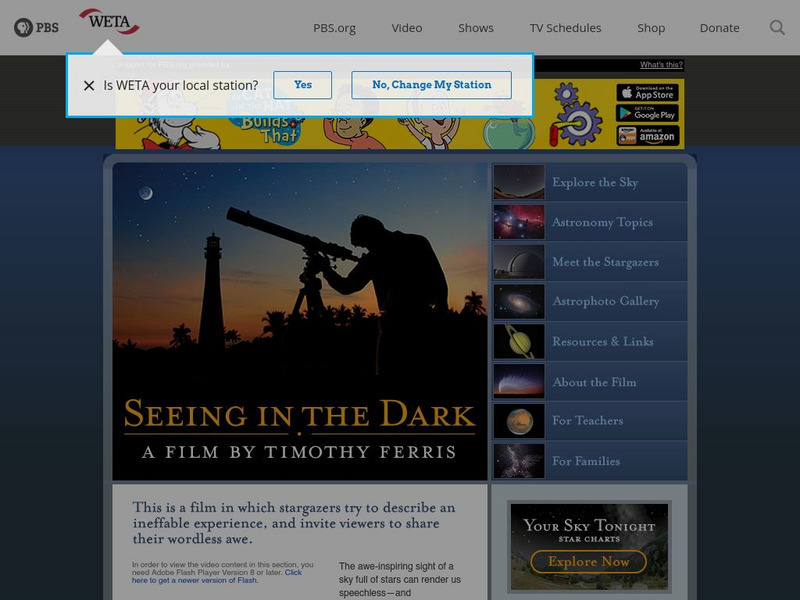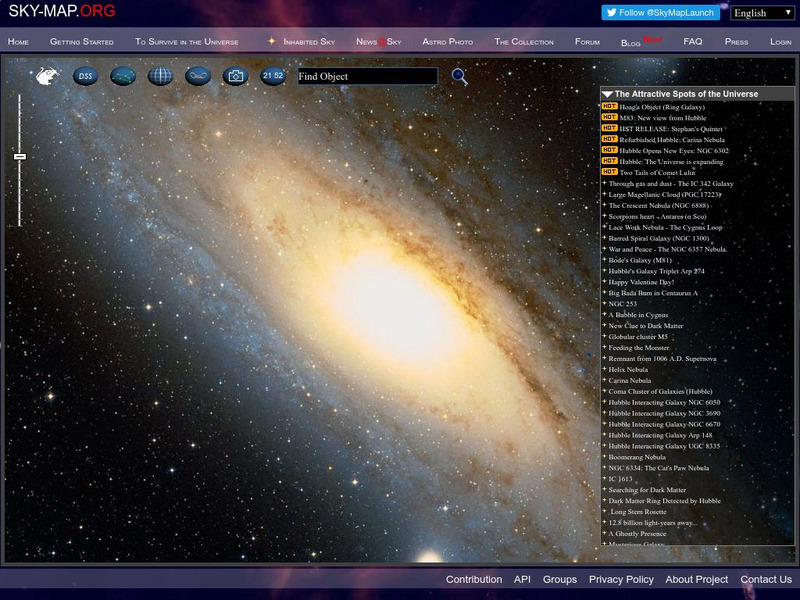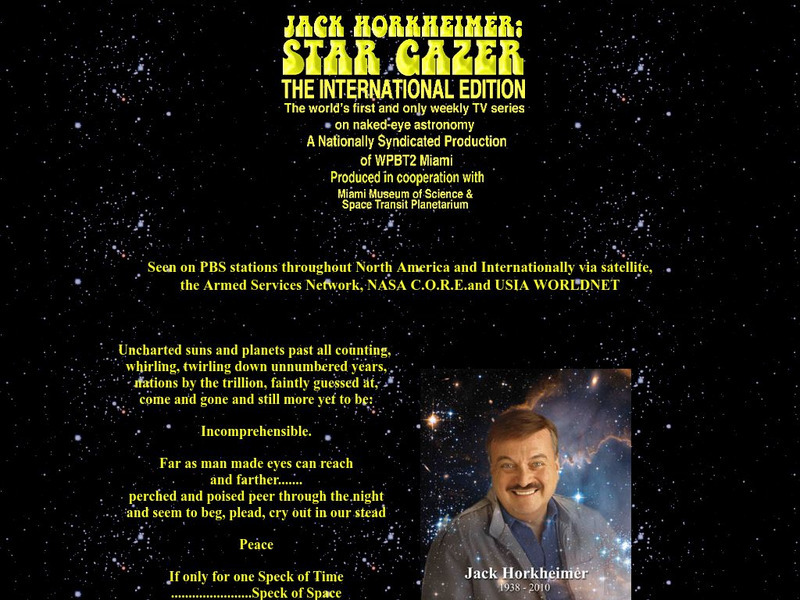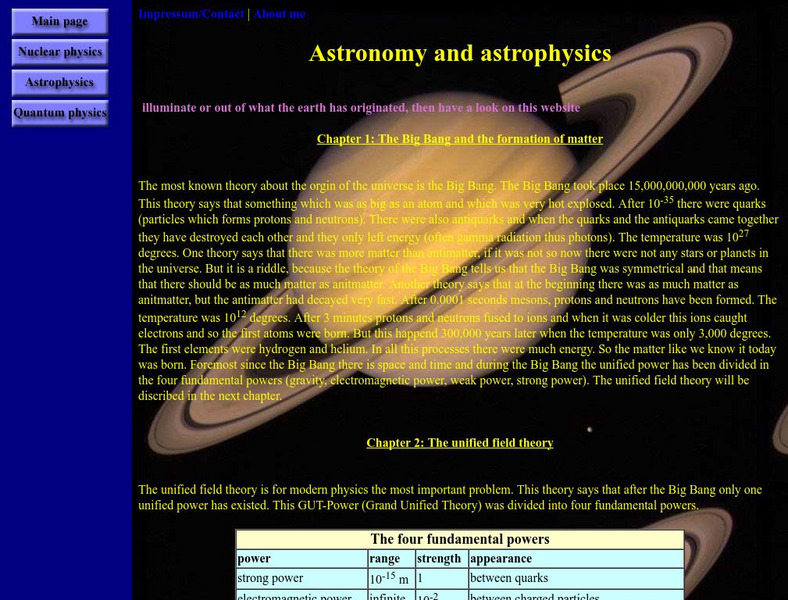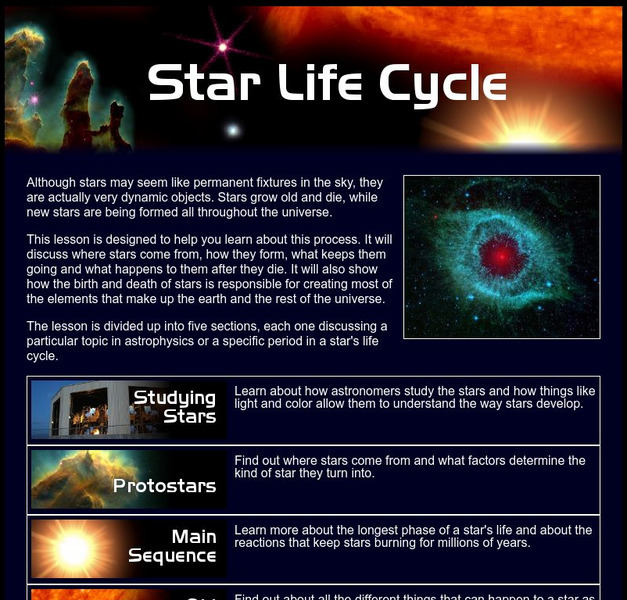University of Florida
Baldwin Library: Steele's Sciences: New Descriptive Astronomy by Joel D. Steele
This is an online photocopy of the original text of the children's book Steele's Sciences: New Descriptive Astronomy by Joel D. Steele (c1884), an astronomy text for children.
University of California
University of California:center for Astrophysics & Space
Supernovae, neutron stars, and pulsars are topics on this page. Extensive section on pulsars that presents information on their discovery, characteristics, evolution, and location.
PBS
Pbs: A Science Odyssey
Website for the PBS series "A Science Odyssey." Numerous opportunities to explore the people and discoveries of science.
PBS
Pbs: Seeing in the Dark
While you won't find the full movie here, there are extensive learning opportunities available to discover the many stars in the sky. Students and teachers will find all sorts of activities, facts, and lessons.
Other
Sloan Digital Sky Survey: Sky Map
This astronomical survey by the Sloan Digital Sky Survey is poised to be one of the most ambitious ever undertaken. When completed, it will provide detailed images covering more than a quarter of the sky, and almost a million galaxies...
Sonoma State University
Sonoma State University: 1938 Bruce Medalist: Edwin Hubble
Site honoring the winners of the Catherine Wolf Bruce medal for lifetime contributions to astronomy. Edwin Hubble, the award winner in 1938, is highlighted in a biography.
Other
National Optical Astronomy Observatory Homepage
The National Optical Astronomy Observatory runs most of the big professional optical telescopes in the United States and this is their homepage. It includes information about the many facilities they run, some of the recent science...
Other
Royal Observatory, Edinburgh
The official homepage of the Royal Observatory in Edinburgh, Scotland.
Other
Royal Astronomical Society
Official homepage for the Royal Astronomical Society, dedicated to "the encouragement and promotion of astronomy and geophysics."
Other
Jack Horkheimer: Star Gazer
This is a site on astronomy in general. If you are into astrophotography, you can find out what is happening in the heavens! Jack Horkheimer is also seen on PBS. You can access the 5 or 1 minute shows on this site.
Other
Astronomylinks
This is a very comprehensive site on the subject of Astronomy and Astrophysics. The site has links to many sites on topics including astronauts, astronomy, astrophysics, education, jobs, etc.
Other
Astronomy and Astrophysics
This site is about Astronomy and Astrophysics. The site has plenty of information and links to related topics.
Other
Noao: Faq's About Being an Astronomer
Do you love to look at the stars? Explore commonly asked questions about becoming an astronomer.
Other
Institute of Physics: Practical Physics
Access hundreds of teacher-tested, practical physics lessons on this well-organized, illustrated site. Find just the right demonstration, attention-grabber, or lab for any physics teaching objective at your fingertips.
Other
Jodrell Bank Centre for Astrophysics: A Tutorial on Radio Pulsars
A extensive site that describes the history of the discovery of pulsars along with definitions, characteristics, locations, and distances of pulsars, plus much more.
University of Utah
University of Utah: Aspire: Life Cycle of a Star
Experience this impressive interactive website about the life cycle of a star.
California Institute of Technology
Caltech Astronomy: Light Pollution and the Palomar Observatory
Learn about light pollution, how it is created, and it's negative impact on astronomical observatories, in particular, the one on Palomar Mountain, California. From the Caltech astronomy department this is an informative look at the...
University of Oregon
Stellar Evolution: White Dwarfs
Brief discussion of white dwarfs, their discovery, and evolution.
Science Buddies
Science Buddies: What Makes the Rings of Saturn?
Saturn is a unique planet because of the many beautiful rings surrounding it. How are all of those rings made? Why is each ring unique?
Other
Center for Educational Resources: Sky Paths
Lesson activities where students observe and describe the movements of objects in the sky in both daytime and nighttime. They learn how early cultures regarded the skies, and the stories they told about them. Students will be given the...
Other
Wisconsin/ Surf Report/web Sites
Wisconsin Educational Communications Board provides numerous links to educational web sites for students and teachers. Its subjects include art, animals, astronomy, Black history, careers, children's books, dinosaurs, environmental...
Other
Wisconsin/ Surf Report/web Sites
Wisconsin Educational Communications Board provides numerous links to educational web sites for students and teachers. Its subjects include art, animals, astronomy, Black history, careers, children's books, dinosaurs, environmental...
Science Buddies
Science Buddies: Where Did All the Stars Go?
If you live in a big city or urban area it is hard to see many stars at night. In most urban areas only the most brilliant stars, planets and the moon can be seen. This is because of something called light pollution which is the...
Science Buddies
Science Buddies: The Moon and the Stars
When you are in the city, only a few of the brightest stars are visible. But when you are in the country, you can see many more stars than you can count. Sometimes you can even see the bright belt of our galaxy, the Milky Way. In this...


